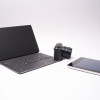
In a digital era defined by portability and convenience, choosing between an Android tablet and a laptop has become a common dilemma. This article compares the two in terms of functionality, price, battery life, and design to help you make an informed decision.
Understanding the Basics: Android Tablet vs Laptop
Before diving into the comparison, it's crucial to define what Android tablets and laptops are and what they offer. Android tablets are touch-based portable devices powered by Google's Android OS. They offer a range of applications for leisure and work activities, with ultimate portability. On the other hand, laptops are portable computers providing capabilities similar to a desktop computer, used for work-intensive tasks, multitasking, gaming, storage, etc.
Functionality: What each Device Excels at
Tablets are designed for media consumption, light gaming, browsing, reading, and simple office tasks. Their touch interfaces and app-based systems make these tasks easy and convenient. Laptops, however, offer a more robust range of functions. They can handle complex work tasks, run various software and heavy games, and offer extensive multitasking with better processing power and storage.
Portability: Comparing Size and Weight
Android tablets generally excel in terms of portability. They are lighter, thinner, and smaller, making them perfect for on-the-go usage. Laptops, while portable, are typically larger and heavier. Nevertheless, recent advancements in technology have resulted in slimmer and lighter laptops.
Battery Life: Lasting Power
Tablets invariably boast longer battery life due to their less power-intensive operations. Laptops, while offering reasonable battery life, tend to consume more power due to their high-performing processors and larger screens.
Price: Budgeting Your Purchase
Price could play a significant role in the decision. Generally, Android tablets can be more budget-friendly, with numerous models available at various price points. Laptops, especially those with high-end processors and extra features, can be significantly more pricey. However, budget and mid-range laptops are also available.
Design and User Experience
The design difference affects the user experience significantly. Tablets offer a touch-screen experience, while laptops provide a physical keyboard and mouse input. However, many tablets now come with detachable keyboards. Laptop users might find the keyboard essential for typing-intensive tasks, while tablet users might prefer the touch-screen experience for web surfing or media consumption.
Final Verdict: Making the Right Choice
Ultimately, the decision comes down to individual needs. If portability, straightforward usage, and long battery life are your priorities, an Android tablet might be the best fit. If you require intense computing power and functionality, a laptop could be the right choice. Consider your needs, your budget, and how you plan to use the device to help you make the best decision.
















